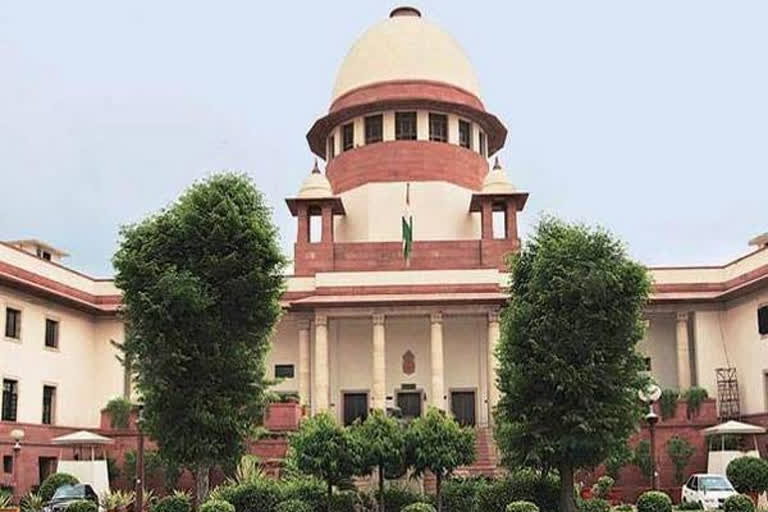New Delhi: The Supreme Court Thursday said that the whole idea of accepting a statement in the name of a dying declaration is that a man will not meet his maker with a lie in his mouth. The top court said it is believed that when a man is at the point of death and when every expectation of this world is gone, it hushes away every motive of the lie.
A bench of Justices Surya Kant and JB Pardiwala refused to interfere with the High Court verdict upholding the trial court decision of convicting two accused of murder and awarding them a life sentence. The bench said, "In the overall view of the matter, we are convinced that there is no good reason to interfere in the present appeal. We do not find any fundamental or basic infirmity in the impugned judgment of the High Court going to the root of the matter calling for any interference by this Court".
It upheld the conviction and sentence of one Kamal Khudal after relying on the oral dying declaration given by the deceased and medical evidence which supported the statement of the deceased. "The whole idea of accepting a statement in the name of dying declaration comes from a maxim 'Nemo moriturus praesumitur mentire' which means that a man will not meet his maker with a lie in his mouth. It is believed that when a man is at the point of death and when every expectation of this world is gone, it hushes away every motive of lie", Justice Pardiwala said in the verdict penned down by him on behalf of the bench.
The top court said that the law regarding the nature, scope, and value as a piece of evidence of oral and written dying declarations is now fairly well settled by various judicial decisions of this Court. "A dying declaration, oral or written, before it could be relied upon, must pass a test of reliability as it is a statement made in the absence of the accused and there is no opportunity to the accused even to put it through the fire of cross-examination to test his genuinity or veracity. The court has, therefore, to subject it to close scrutiny.
But once the court is satisfied that it is a truthful version as to the circumstances in which the death resulted and the persons causing injuries, the law does not expect that there should be corroboration before it can be relied upon", it said. The bench said that if there are infirmities and the court does not find it safe to base any conclusion on it without some further evidence to support it, the question of corroboration arises.
It noted that the oral evidence of the prosecution witness is quite natural as on the day of occurrence, he was working in his agricultural field and his presence in his field could be said to be natural. "There is no good reason for prosecution witness to come before the trial court and depose falsely against the accused persons", it said, adding that it is not even the case of the accused-appellant herein that prosecution witness had some axe to grind against him, including the other co-accused and, therefore, fabricated the entire story of an oral dying declaration.
It said that the oral dying declaration of the deceased made before the prosecution witness stands corroborated with the medical evidence on record. "The medical evidence on record would suggest that there were 75 per cent burn injuries on the chest of the deceased. The burn injuries were suffered by the deceased as the accused persons are said to have poured hot lali (the raw material used for preparing liquor)", it said.
The bench also took note of the fact that the Khudal came to be arrested on July 23, 2007, that is, almost after about eight days from the date of the incident. "He was absconding. He was not available at his house. The appellant-accused in his further statement recorded under Section 313 of the CrPC has not explained where he was between July 15, 2007, and July 23, 2007, that is, till the date of his arrest. This is one another incriminating circumstance and, if taken into consideration with the other circumstances on record, would bear some relevance while deciding the guilt of the accused", it said.
The bench said, "It appears to be a case of a sudden fight. It could be on account of some verbal altercation between the deceased and the accused persons while they were inside the liquor factory". According to the FIR, on July 15, 2007, at about 7 a.m. Khudal along with the co-accused (Munna Bhoi) came to the house of the deceased (Uttam Dutta). The accused persons took the deceased along with them for paddy plantation and when the deceased did not return to his house till late evening.
According to the prosecution, the deceased after working for some time in the paddy field accompanied the accused persons to the liquor factory where something went wrong while the accused persons and the deceased were in the liquor factory. After some time, the locals saw the deceased coming out of the factory with burn injuries on his body, and the prosecution witness, who was present in the nearby agricultural field, enquired with the deceased as to what had happened.
The deceased is said to have informed him that the accused persons had poured hot lali (the raw material used for preparing local liquor) on his body as a result of which he had suffered burn injuries. After saying so, the deceased left, and thereafter his dead body was recovered from the drain of Duribam Tea Estate. (PTI)



